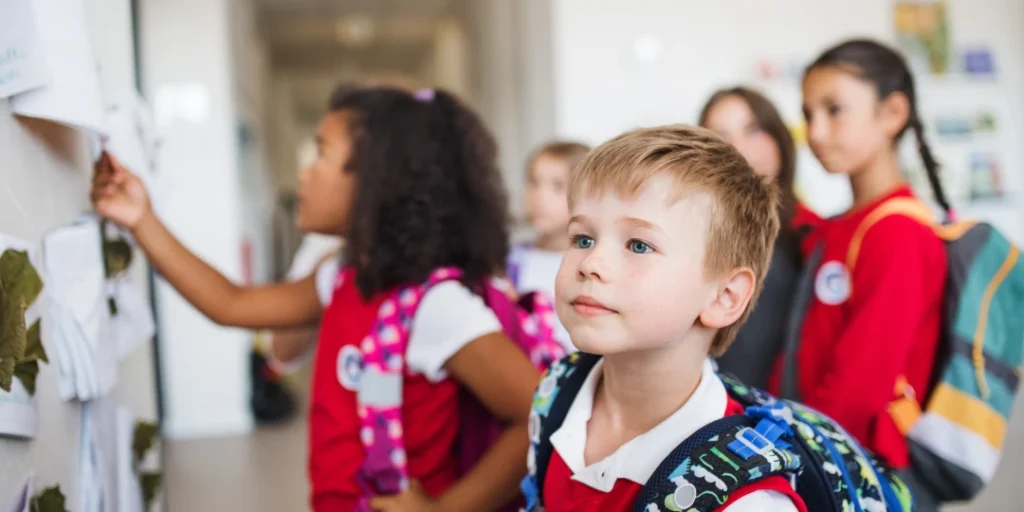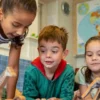![From Toddlers to Pre-K: How Hermitage Hills Day School Nurtures Growth at Every Stage Introduction: Laying the Groundwork for Lifelong Learning At Hermitage Hills Day School, early childhood is treated with the significance it deserves. The school views these first years not as a […]](https://dayschools.org/hermitage/wp-content/uploads/sites/5/2025/05/Murfreesboro-Day-School-9.webp)
Table of Contents
Introduction: Laying the Groundwork for Lifelong Learning
At Hermitage Hills Day School, early childhood is treated with the significance it deserves. The school views these first years not as a precursor to “real” education, but as the essential foundation upon which all future learning is built. With that conviction, every element of the experience—from the pace of the day to the tone of teacher-child interactions—is approached with intentionality. Children are encouraged to explore, question, and grow at a pace that honors their individuality. The goal isn’t to mold a child into a particular outcome, but to help them unfold into their fullest potential.
This foundational philosophy is evident across all age groups within Hermitage Hills Day School. Classrooms are designed to support the developing child both intellectually and emotionally. Educators here are attentive guides, not mere instructors. They build strong relationships with each child, observing closely to offer support that is both timely and appropriate. Their presence offers stability, their guidance offers challenge, and their care offers the emotional fuel children need to take risks and build confidence.
Hermitage Hills Day School integrates this vision into its culture and community. The daily rhythms are predictable yet flexible, giving children a secure base while allowing room for spontaneity and exploration. The environment itself is calm, well-structured, and full of open-ended learning opportunities. Whether in a quiet moment of independent play or an engaged group activity, children are building the habits of mind that last a lifetime: curiosity, perseverance, empathy, and self-direction.
The Early Years: Why the First Five Matter Most
The first five years of a child’s life are marked by a level of neurological activity that is unmatched in later years. During this time, over a million neural connections form every second, creating the architecture for learning, behavior, and health. Hermitage Hills Day School embraces this critical period with deep responsibility. The school’s curriculum is shaped by evidence-based research and driven by an understanding of child development as both a science and an art. Through carefully planned experiences, children’s brains are given the stimulation they need to thrive.
At Hermitage Hills Day School, each classroom is a microenvironment attuned to the developmental needs of the children it serves. In the toddler classrooms, learning happens through rich sensory input and freedom of movement, allowing children to explore the world with their whole bodies. As they grow, the curriculum evolves. Older preschoolers engage in more structured collaborative work, build complex language skills, and deepen their social understanding through guided group experiences. This developmental alignment ensures that children are never overwhelmed or under-stimulated—they are challenged just enough to grow.
By grounding its approach in the critical nature of the early years, Hermitage Hills Day School invests not only in school readiness, but in lifelong wellbeing. Children leave the program equipped with more than just knowledge—they leave with a sense of who they are, what they can do, and how to connect with the world around them. This is the kind of growth that lays the groundwork for true readiness: not just for kindergarten, but for life as a thinking, feeling, capable human being.

A Toddler’s World: Curiosity, Security, and Exploration
The toddler years are a time of extraordinary transition. Walking replaces crawling, babbling transforms into words, and the drive to explore becomes relentless. At Hermitage Hills Day School, this period of growth is met with thoughtful structure and deep empathy. The toddler environment is intentionally crafted to strike a balance between freedom and reassurance. Children are free to explore, but always within reach of a trusted adult who offers a steady presence and a calming voice. This consistent support allows toddlers to step into the unknown with confidence, knowing they are seen and safe.
Within the classroom, materials are accessible, open-ended, and rotated regularly to invite fresh curiosity. Toddlers pour, stack, scoop, and sort—activities that may seem simple, but are in fact complex exercises in coordination, concentration, and cause-and-effect thinking. Teachers don’t interrupt these moments with direction; instead, they join the child’s world with respectful observation and timely engagement. A quiet “What are you building?” or “I see you’re trying that again” supports both language development and problem-solving without undermining autonomy.
Hermitage Hills Day School understands that even the most curious toddler needs emotional grounding. When frustration, separation anxiety, or fatigue arise, teachers respond with calm consistency. Routines are predictable, transitions are gently guided, and each child’s temperament is honored. Through this responsive care, toddlers begin to internalize key developmental lessons: that their feelings are manageable, their voices matter, and their curiosity is a powerful tool for learning.
Cultivating Emotional Intelligence in Young Children
Emotional intelligence doesn’t appear overnight—it’s cultivated over time, through repeated experiences of being understood, guided, and supported. At Hermitage Hills Day School, emotional development is integrated into every aspect of the learning environment. Children are encouraged to name their feelings, notice others’ emotions, and develop strategies for managing strong reactions. These skills aren’t taught through charts or lectures—they’re modeled in the moment by teachers who remain attuned to the emotional climate of the classroom.
Teachers take the time to narrate emotional experiences in real-time. If a child is upset after a conflict, the teacher might kneel down and say, “You look frustrated. You wanted a turn with the truck.” This kind of language helps children connect internal states to external expression. Over time, children begin to mirror this practice, saying things like “I’m mad!” or “I need help.” This self-awareness is the first step toward emotional regulation, and it is consistently reinforced by compassionate, grounded adult responses.
Hermitage Hills Day School also supports peer interactions with the same level of care. Group play, by nature, invites moments of disagreement or disappointment. Instead of correcting behavior with reprimands, educators use these moments to model empathy and problem-solving. “Let’s ask her if she’s okay.” “How could we fix this together?” In doing so, children begin to see conflict not as failure, but as an opportunity to build stronger, more respectful relationships. These lessons carry far beyond the classroom—they are the building blocks of emotional maturity and healthy social interaction.
Language Development: Listening, Speaking, and Understanding
Language shapes how we think, relate, and learn. At Hermitage Hills Day School, language development is not a separate subject—it’s the thread that weaves through every activity, interaction, and experience. From the earliest coos and babbles to full-fledged storytelling, children are immersed in a language-rich environment where communication is constantly modeled and reinforced. Teachers speak with clarity and intention, narrating actions, posing open-ended questions, and inviting children into meaningful dialogue throughout the day.
In toddler classrooms, language is supported through repetition, rhythm, and responsive conversation. Simple songs, fingerplays, and naming games help children build vocabulary and phonological awareness. Educators follow the child’s lead, responding to gestures and sounds with real words that affirm their attempts to communicate. As children grow, the emphasis shifts to expressive language, storytelling, and comprehension. Books are read aloud not just for entertainment, but as springboards for discussion. Children are asked to predict, reflect, and share their own ideas.
The school also recognizes that every child’s communication journey is unique. Some may speak early and fluently; others may take more time or rely initially on gestures and visuals. Hermitage Hills Day School meets each child where they are, using multimodal strategies—visual cues, sign language, modeling—to support understanding and expression. This inclusive approach ensures that all children feel heard and empowered to express themselves, whether with words, signs, or imaginative play. Over time, they come to see language not just as a tool, but as a bridge—to learning, to connection, and to the world.

Hands-On Learning: The Cognitive Benefits of Purposeful Play
At Hermitage Hills Day School, play is never viewed as a distraction from learning—it is the work of childhood. Every puzzle piece placed, every block tower constructed, and every imaginary picnic staged represents layers of cognitive development unfolding. Through play, children experiment with ideas, test hypotheses, make mistakes, and try again. The classroom is their laboratory, and they are natural scientists—curious, determined, and deeply engaged with the world around them.
Teachers at Hermitage Hills Day School create rich environments that invite children to explore, sort, classify, and build. Materials are open-ended: a set of wooden blocks can become a zoo, a spaceship, or a city skyline depending on the child’s imagination. This flexibility challenges young learners to problem-solve, collaborate, and persist in the face of uncertainty. When a tower falls, a child learns not just about balance and gravity but about resilience and creative adjustment. These experiences shape critical executive functioning skills such as working memory, impulse control, and cognitive flexibility.
Cognitive development is further supported through intentional scaffolding. Educators observe children at play and offer subtle, timely prompts to extend their thinking. “What else could we use to make that stronger?” or “How did you decide to put that there?” These questions nudge children toward reflection, helping them move from action to understanding. Hermitage Hills Day School trusts in the power of play to cultivate deep learning—and it equips its teachers with the insight to guide that process without diminishing the child’s sense of agency and ownership.
Encouraging Artistic and Creative Expression
Creativity is not a luxury—it is a necessity for problem-solving, empathy, and innovation. Hermitage Hills Day School recognizes this and treats artistic expression as a core component of its curriculum. Children are given space and materials to draw, paint, mold, sing, dance, and act—not as a break from learning, but as a way of deepening it. Creativity here is not confined to a narrow definition of art. It is a mindset, a method of exploration, and a valid way to understand the world.
In the art area, materials are abundant and accessible. Children can reach for pastels, paper, fabric scraps, or clay and begin creating without waiting for instructions. The process is honored above the product. Teachers might ask, “What were you thinking about while you painted this?” rather than offering praise for how something looks. This approach values the child’s perspective and invites them to reflect on their choices, encouraging both confidence and intentionality. It also supports the development of fine motor skills and visual-spatial reasoning in a way that feels natural and joyful.
The school also integrates creative expression into other learning domains. Music enhances phonemic awareness and memory. Dramatic play builds social understanding and perspective-taking. Movement activities foster body awareness and coordination. By weaving the arts throughout the day, Hermitage Hills Day School ensures that children experience learning with their whole selves—body, mind, and spirit. These expressive outlets allow for emotional release, self-discovery, and a sense of accomplishment that no worksheet could replicate.
Fostering Independence in the Transition to Pre-K
The years leading up to Pre-K are a critical time for cultivating independence. Hermitage Hills Day School approaches this shift not with urgency, but with care. Children are gently encouraged to take increasing responsibility for themselves—choosing activities, managing belongings, and solving problems with minimal adult intervention. These moments of autonomy build more than self-help skills; they shape identity. The message is clear: “You are capable. You can try. You can do this.”
Independence is built through structure and opportunity. Routines are predictable yet flexible, giving children a sense of control within safe boundaries. Visual cues and verbal prompts support transitions and decision-making. A child might learn to zip their coat, serve their own snack, or set the table for a group activity. These acts of competence, repeated daily, foster pride and a sense of ownership over one’s experience. Mistakes are welcomed as learning tools rather than failures.
Educators at Hermitage Hills Day School know when to step back and when to lean in. They resist the urge to solve problems too quickly, instead offering encouragement: “What could you try next?” or “Can you think of another way?” This cultivates persistence and adaptive thinking. As children prepare for the structure and expectations of kindergarten, they do so with a solid foundation of self-direction and confidence. They are not just ready to learn—they are ready to take initiative in their learning, a hallmark of lifelong success.
The Pre-K Experience: Readiness Through Routine and Challenge
Pre-K at Hermitage Hills Day School is intentionally designed to help children bridge the gap between early childhood and formal schooling. It’s a time when curiosity is sharpened into focus, and play begins to take on more structured, goal-oriented form. In this final stage before kindergarten, children are exposed to the rhythms of a school day—circle time, group projects, independent tasks—but in an environment that still centers joy, discovery, and individuality. The result is a confident learner who approaches challenge not with hesitation, but with enthusiasm.
Routine becomes a vital tool in this readiness process. Children learn how to transition between activities, manage their belongings, and follow multi-step directions. These skills might seem simple, but they represent a major developmental leap. By understanding what to expect—and how to act within those expectations—children gain a sense of stability that allows them to take intellectual risks. Hermitage Hills Day School leverages this consistency to build stamina, concentration, and emotional regulation, all essential for success in more structured academic settings.
At the same time, the Pre-K curriculum introduces foundational academic concepts in a developmentally appropriate way. Letter recognition, phonemic awareness, number sense, and scientific inquiry are embedded into meaningful activities. Children count while cooking, sort by color and shape during art, and build literacy through storytelling and journal work. Rather than drilling information, teachers cultivate deep understanding by making learning relevant and hands-on. This approach ensures that by the time children leave Hermitage Hills Day School, they are not only academically prepared—they are engaged, confident learners who are excited for what comes next.

Partnership with Families: A Collaborative Approach
The relationship between school and family is not peripheral—it is central to a child’s success. Hermitage Hills Day School values parents as essential partners in the learning journey and works hard to build strong, reciprocal relationships from the very beginning. This begins with consistent, respectful communication. Teachers share not just logistical updates but real insights into each child’s growth, challenges, and triumphs. Parents are invited into the process—not as observers, but as collaborators who bring invaluable knowledge about their child’s personality, history, and needs.
This collaborative approach is reflected in both formal and informal exchanges. Conferences are thoughtful and goal-oriented, providing space for reflection and shared planning. Daily reports give families a window into classroom life. Informal conversations at drop-off or pick-up help reinforce the connection between home and school. At Hermitage Hills Day School, these touchpoints aren’t transactional—they are opportunities to strengthen alignment and trust.
The school also provides avenues for deeper involvement. Family events, volunteer opportunities, and parent workshops invite caregivers into the school culture and create a sense of shared purpose. When families feel included, children benefit. They see that the people they love and the people who teach them are united in support of their growth. This continuity between environments fosters a sense of stability and belonging. Hermitage Hills Day School knows that when school and family work together, the child stands at the center of something powerful: a community fully invested in their flourishing.
Conclusion: Growing Confident, Capable Learners
Hermitage Hills Day School offers more than early education—it offers intentional beginnings. From the tentative first steps of toddlerhood to the confident strides of Pre-K, each stage is shaped by care, insight, and purpose. Children are not rushed through milestones or molded to fit a one-size-fits-all framework. Instead, they are seen, heard, and supported as unique individuals with boundless potential. Every classroom, every interaction, and every routine is built to nurture not just knowledge, but self-trust, empathy, and a love for learning.
The school’s strength lies in its ability to balance structure with spontaneity, challenge with support, and academic rigor with emotional depth. Learning happens through play, through conversation, through movement and reflection—woven into a daily rhythm that feels both meaningful and joyful. This approach does more than prepare children for kindergarten. It fosters thinkers who are curious, friends who are compassionate, and individuals who are ready to face new environments with confidence and adaptability.
By honoring the complexity and beauty of early childhood, Hermitage Hills Day School creates a strong foundation for the years ahead. But more importantly, it instills a sense of belonging and belief in each child’s capacity to grow. These are the roots of lifelong learning. These are the first steps toward a future where each child leaves not only prepared—but empowered.





